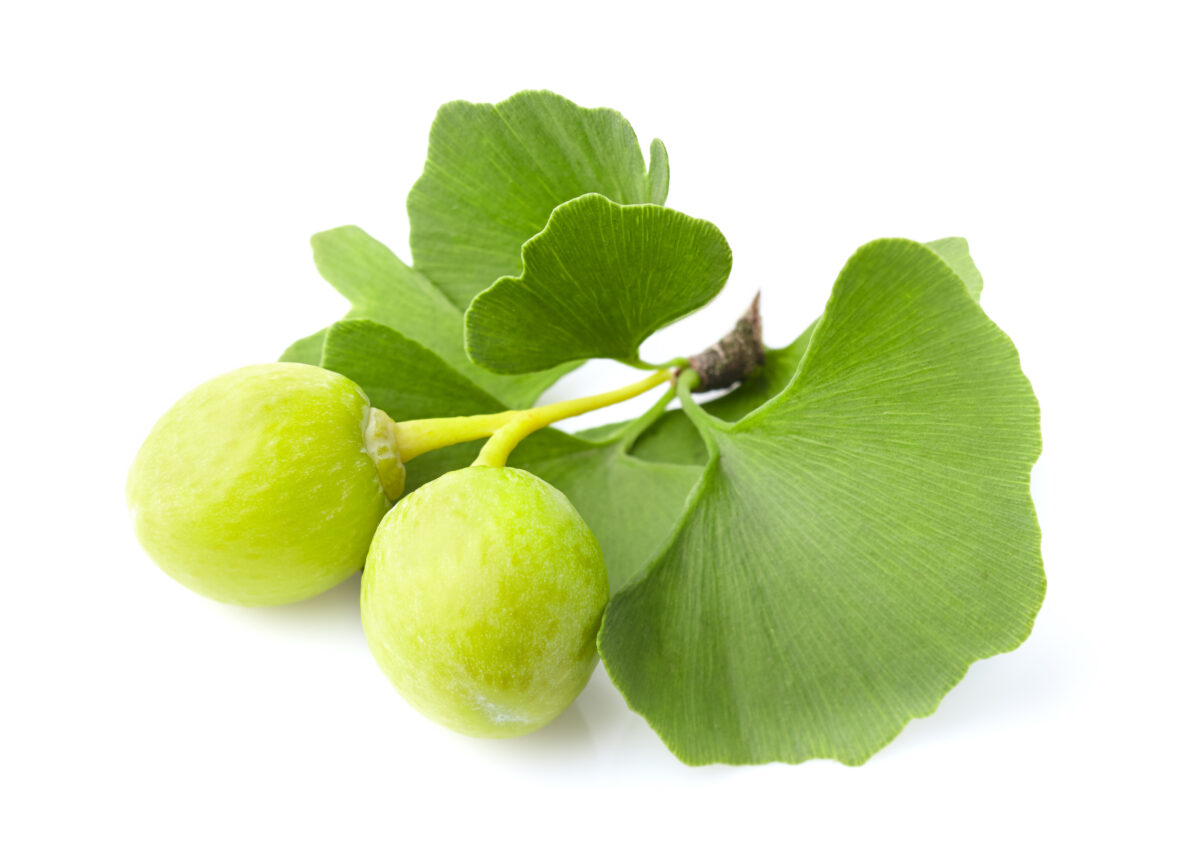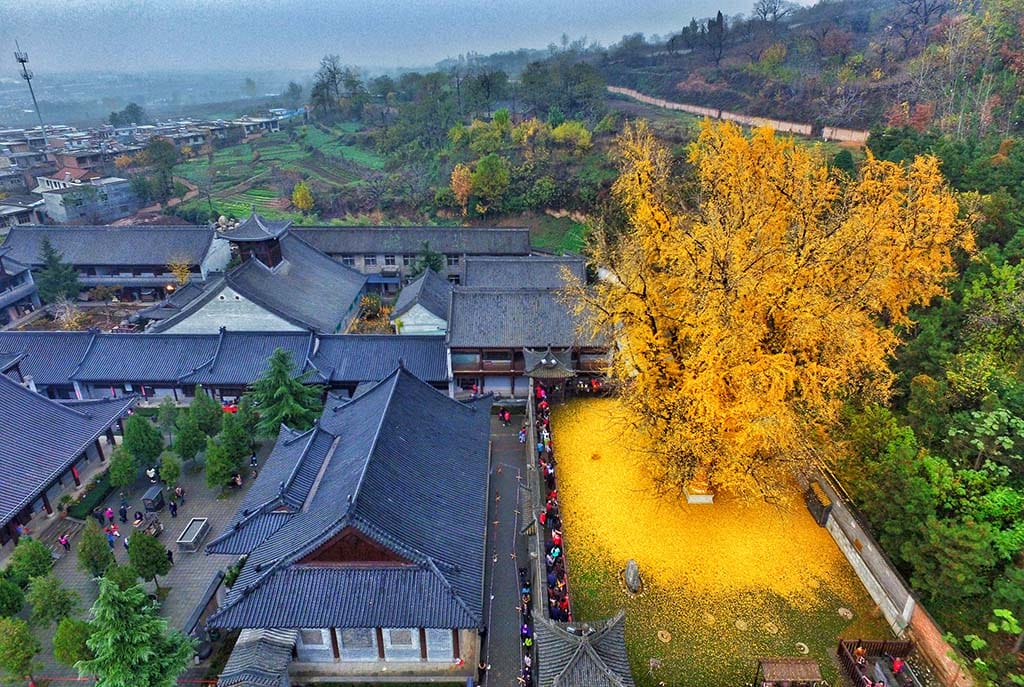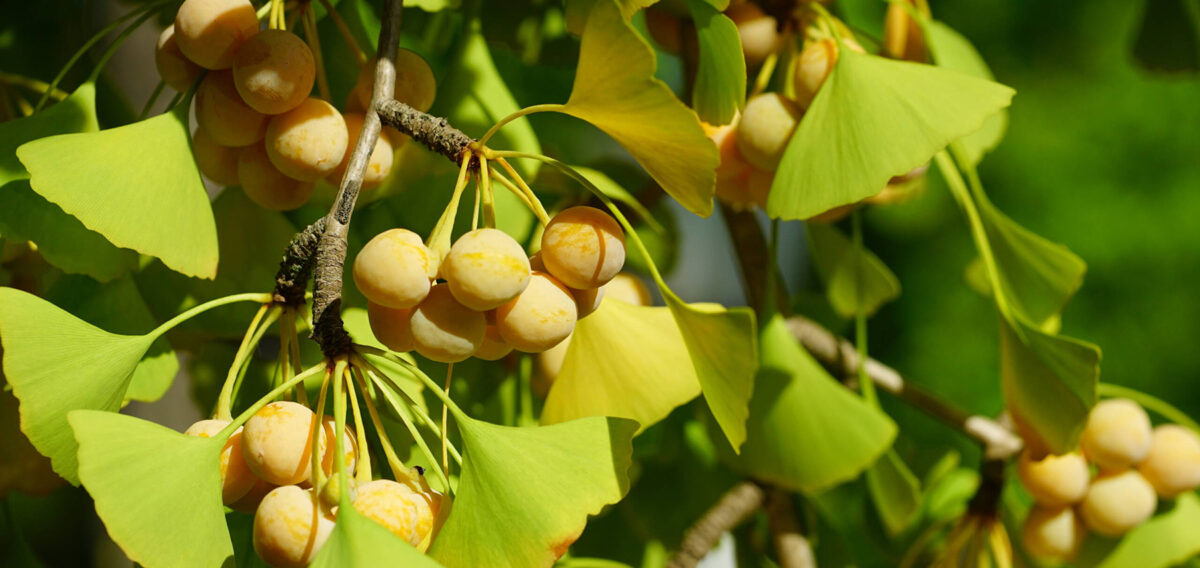
Amikor a dinoszauruszok több mint 200 millió évvel ezelőtt bejárták a Földet, a ginkgo fa már akkor is erősen termett. Ma ez a figyelemre méltó "élő fosszília" nem csak túlél - segít az emberi agyaknak boldogulni rohanó világunkban.
Jellegzetes, legyező alakú levelei olyan erős vegyületeket tartalmaznak, amelyek javíthatják az agy vérellátását, védik az idegsejteket, és fokozzák a kognitív funkciókat olyan módon, amelyet a tudomány és a hagyományos orvoslás is felismert.
Akár aggódik a szellemi éleslátás megőrzése miatt, akár természetes támogatást keres a napi fókuszáláshoz, vagy egyszerűen csak kíváncsi erre a figyelemre méltó növényre, ez az átfogó áttekintés mindent megad, amire szüksége van a ginkgo biloba potenciális előnyeinek megértéséhez.
A ginkgo fa a természet egyik legkülönlegesebb élőlénye. Könnyen felismerhető legyező alakú leveleiről, amelyek középen kettéhasadnak, és így jellegzetes, kétlevelű mintázatot alkotnak (ezért nevezték el a tudósok bilobának). Ezek a levelek minden ősszel ragyogó aranysárgára színeződnek, mielőtt lehullanak, lenyűgöző tájat varázsolva a parkokba és az utcákra világszerte.

A legtöbb ma ismert fától eltérően a ginkgóknak külön hím és nőstény fái vannak. A nőstények apró, kerek gyümölcsöket teremnek, amelyeknek erős, kellemetlen szaga az avas vajra emlékeztet. E bűzös tulajdonsága ellenére sok város azért választja a hím ginkgo fák telepítését az utcák mentén, mert hihetetlenül ellenállóak a légszennyezéssel, a kártevőkkel és betegségekkel, a szélsőséges időjárási viszonyokkal és a városi környezettel szemben. Ez a figyelemre méltó ellenálló képesség teszi a ginkgókat tökéletesen alkalmassá a városi kertépítésre, ahol olyan kihívást jelentő körülmények ellenére is jól fejlődnek, amelyek sok más fafajt megterhelnének vagy elpusztítanának.
Ezek a Kínában őshonos, figyelemre méltó fák elérhetik a 30 méteres magasságot, és több mint 1000 évig élnek. A kínai és japán templomokban található ősi példányok némelyike több mint 2500 évesnek számít, így az emberi történelem élő tanúi.
A ginkgo ellenálló képességének talán legerősebb bizonyítéka a japán Hirosimából származik. Hat ginkgo fa azon kevés élőlények közé tartozott, amelyek a robbanás helyszínének rövid körzetében életben maradtak - ésmég ma is állnak. Ezért a japánok a ginkgót "a remény hordozójának" tekintik. A "túlélő" és az "élő kövület" néven is ismert.
A buddhista szerzetesek évszázadok óta gondosan ápolják a templomaik körüli ginkgo fákat, és a leveleket és magokat hagyományos gyógymódokban használják. Ez a spirituális kapcsolat, valamint a fa ősi származása miatt a ginkgo különleges helyet foglal el a keleti kultúrákban, ahol a hosszú életet, a rugalmasságot és a reményt szimbolizálja.
Ma a ginkgo fák az Antarktisz kivételével minden kontinensen nőnek, alkalmazkodva a hideg északi régióktól a trópusi övezetekig, ami bizonyítja a figyelemre méltó alkalmazkodóképességet, amely segítette ezt a fajt a túlélésben, amikor számtalan más faj eltűnt.

A Ginkgo biloba terápiás hatékonysága a leveleiben található különleges természetes vegyületeknek köszönhető. A legjobban vizsgált formája az EGb 761®, amelyet gondosan standardizáltak - vagyis úgy állítják elő, hogy minden alkalommal pontos mennyiségű hatóanyagot tartalmazzon, ellentétben a nyers gyógynövényekkel, amelyek hatékonysága nagymértékben változhat.
Ez a standardizált kivonat a következőket tartalmazza:
Ez a konkrét 24:6 arány jelentősen számít - ez olyan, mint egy pontos recept, amely a kutatások szerint következetesen működik, míg a nem szabványosított készítmények (mint például néhány alapvető étrend-kiegészítő) hatékonysága nagymértékben eltér.
A tudósok többféleképpen fedezték fel, hogy a Ginkgo az agy egészségét támogatja - mint egy szerszámkészlet több eszköze, amelyek mindegyike a kognitív funkciók különböző aspektusait kezeli:
Felfedezték, hogy a Ginkgo számos egymást kiegészítő módon támogatja az agy egészségét, amelyek mindegyike a kognitív funkciók különböző aspektusait érinti. A kutatások[15] azt mutatják, hogy a Ginkgo javítja az agy vérkeringését azáltal, hogy segít az ereknek több nitrogén-oxidot termelni és csökkenti a vérlemezkék ragadását. Ez a fokozott véráramlás kulcsfontosságú, mivel az agy a test oxigén- és glükózmennyiségének 20%-át használja fel, annak ellenére, hogy testsúlyának mindössze 2%-át teszi ki - a jobb keringés azt jelenti, hogy az agysejtek megkapják az optimális működéshez szükséges üzemanyagot és oxigént.
Sejtszinten a vizsgálatok[16] azt mutatják, hogy a Ginkgo erős antioxidáns védelmet nyújt, közvetlenül semlegesíti a káros szabad gyököket, miközben a szervezet saját természetes antioxidáns rendszereit, például a szuperoxid-dizmutázt és a glutation-peroxidázt is erősíti. Olyan, mintha egyrészt lenne egy azonnali takarítócsapatunk a sejtkárosodások ellen, másrészt a szervezet saját karbantartó csapatát is edzenénk, hogy hatékonyabban működjön. Ezt a védelmet a Ginkgo gyulladáscsökkentő tulajdonságai egészítik ki, a vélemények[11] szerint csökkenti az agyi gyulladást a gyulladásos hírvivő molekulák blokkolásával és a mikroglia nevű speciális immunsejtek megnyugtatásával. Míg a gyulladás segít a fertőzések leküzdésében, a krónikus agyi gyulladás olyan, mint egy lassan égő tűz, amely idővel károsítja a sejteket, és hozzájárul a kognitív hanyatláshoz.
A ginkgo több mechanizmuson keresztül védi az agy szerkezetét is. Kutatások[8] kimutatták, hogy vegyületei képesek megzavarni a béta-amiloid fehérjék összecsomósodását - gondoljunk ezekre a csomókra úgy, mint forgalmi dugókra az agyban, amelyek blokkolják a normális sejtkommunikációt. Emellett a tanulmányok[13] szerint a Ginkgo segít megelőzni a tau fehérjék abnormális módosulását, amelyek úgy működnek, mint a tápanyagokat az agysejteken keresztül szállító vasúti sínek. Amikor a tau károsodik (hiperfoszforilálódik), ezek a sínek elcsavarodnak és összegabalyodnak, megzavarva a sejtek közlekedését. Ez Alzheimer-kórhoz vezethet.
A védőhatások a sejtek energiarendszerére is kiterjednek. Kutatások[14] szerint a Ginkgo segít stabilizálni a mitokondriumokat (a sejtek erőműveit) és fokozza az energiatermelést - lényegében védi a sejtek energiahálózatát még stresszes körülmények között is. Végül, több tanulmány[9] bizonyítja a Ginkgo azon képességét, hogy kiegyensúlyozza az olyan agyi kémiai anyagokat, mint az acetilkolin (memória), a dopamin és a szerotonin (hangulat), valamint a noradrenalin (éberség). Ezek a neurotranszmitterek az agysejtek közötti információt szállító hírvivőként működnek, és kiegyensúlyozott szintjük támogatja az egészséges kognitív funkciókat, a figyelmet és az érzelmi jólétet.

Nem minden Ginkgo-kutatás mutat azonos eredményeket, mivel a különböző embercsoportok eltérő módon reagálhatnak. Itt van, amit a tudomány mond nekünk:
A legerősebb bizonyítékok a Ginkgo használatát támogatják a már kognitív kihívásokkal küzdő emberek esetében:
Memória és kognitív funkciók: A több vizsgálatot kombináló nagyszabású elemzések (metaanalízisek)[11, 9] jelentős javulást találtak a memória, a figyelem és a végrehajtó funkciók (tervezés, problémamegoldás) terén, amikor a kognitív hanyatlásban szenvedő emberek naponta 240 mg standardizált Ginkgo-kivonatot szedtek.
A mindennapi életvitelhez szükséges tevékenységek (ADL): Egy átfogó áttekintés[10], amely 2684 beteg adatait elemezte, kimutatta, hogy a Ginkgo segítette az embereket a mindennapi tevékenységek függetlenségének megőrzésében. Ezek a javulások összehasonlíthatóak voltak a vényköteles gyógyszerekhez, az úgynevezett kolinészteráz-gátlókhoz (mint a donepezil).
Neuropszichiátriai tünetek: A kutatás[12] kimutatta, hogy a Ginkgo jelentősen csökkentette a szorongást, a depressziót és a viselkedésbeli változásokat, amelyek gyakran kísérik a kognitív hanyatlást. Az előnyök különösen észrevehetőek voltak azoknál az embereknél, akiknek mind kognitív, mind hangulati tüneteik voltak.
Adagolásfüggő hatások: Az elemzés[13] megerősítette, hogy a magasabb dózisok (240 mg/nap) következetesen jobban működtek, mint az alacsonyabb dózisok (120 mg/nap), és a legalább 22-24 hétig tartó kezelés mutatta a legjobb eredményeket.
A Ginkgóval kapcsolatos kutatások lenyűgöző képet mutatnak arról, hogy kinek és pontosan hogyan segít az agynak. Mint sok más természetes vegyület, a Ginkgo sem működik mindenkinél ugyanúgy - gondoljunk rá úgy, mint egy kulcsra, amely egyes zárakhoz jobban illik, mint másokhoz.
Azok számára, akik már észlelnek némi "mentális rozsdát" - amit a tudósok enyhe kognitív károsodásnakneveznek - a ginkgoígéretes eredményeket mutat. A mérföldkőnek számító GuidAge-kísérlet[5] felfedezte, hogy a hosszú távú Ginkgo használat segített bizonyos gondolkodási képességek élesítésében, bár nem volt csodaszer, amely minden kognitív hanyatlást megakadályozott volna. Még izgalmasabb, hogy a legújabb kutatások[3] azt sugallják, hogy a Ginkgo korábbi kezdete a kognitív öregedési folyamatban olyan lehet, mintha egy kis szivárgást elkapnánk, mielőtt árvízzé válna - potenciálisan hatékonyabb az agyműködés megőrzésében, ha hamarabb kezdjük el.
Itt a kép árnyaltabbá válik. A fiatalabb, kognitív szempontból egészséges embereken végzett vizsgálatok[1, 2] azt mutatják, hogy a Ginkgo finom teljesítménynövelést kínál elsősorban a memória és a figyelem terén - azzal az érdekes fordulattal, hogy a nők gyakran erősebb reakciókat mutatnak, mint a férfiak (hölgyek, figyelem!). Egy áttekintés[4] megállapította, hogy egyetlen adag átmenetileg fokozhatja az agy "végrehajtó funkcióit" (például a tervezést és a döntéshozatalt), hasonlóan ahhoz, ahogyan egy csésze kávé néhány órára élesíti a fókuszt. Egy 6 éven át tartó, nagyszabású prevenciós vizsgálat[11, 17] azonban kimutatta, hogy a Ginkgo nem csökkentette jelentősen a demencia arányát egészséges idősebb felnőttek körében - ami arra utal, hogy hatékonyabb a meglévő kognitív kihívások kezelésére, mint azok teljes megelőzésére.
Különösen érdekes, hogy a Ginkgo hogyan hat a különböző mentális képességekre. A memória - talán a legértékesebb kognitív kincsünk - esetében a ginkgo többféleképpen is segít. Klinikai kísérletek[10] szerint jelentősen javítja az epizodikus memóriát (az élményekre és eseményekre való emlékezést) a demenciában szenvedő embereknél, segítve őket az életesemények felidézésében és a fontos információk felismerésében. A munkamemória - az agyunk mentális jegyzettömbje - esetében a tanulmányok mérsékelt javulást mutatnak a kognitív kihívásokkal küzdő embereknél, bár a teljesen egészséges egyéneknél vegyes eredményeket mutatnak[4]. Ez megmagyarázhatja, hogy miért észlelhet drámaibb előnyöket, ha már tapasztalja a "hová tettem a kulcsaimat?" pillanatokat.

A figyelem is jelentős lökést kap. Több tanulmány[6] szerint a Ginkgo segít a fókuszálásban és a koncentrációban, különösen akkor, ha Ön már küzd figyelemzavarokkal. Érdekes módon a figyelem megosztásának képessége a feladatok között (például főzés közbeni beszélgetés közben) sokkal következetesebben javul, mint a tartós figyelem hosszú időn keresztül[9] - ami arra utal, hogy a Ginkgo inkább segíthet a mentális multitaskingban, mint a maratoni koncentrációs ülésekben.
A mentális feldolgozási sebesség - a gondolkodás és a reakciókészség - szerény javulást mutat az átfogó áttekintések szerint[13], különösen a keringéssel összefüggő kognitív problémákkal küzdő idősebb felnőttek esetében. Mivel a Ginkgo fokozza az agy vérellátását, ez tökéletesen érthető: a jobb keringés gyorsabb idegpályákat jelent.
A Ginkgo a végrehajtó funkciókat - az agy vezérigazgatóját - is támogatja. A kutatások szerint javul a mentális rugalmasság, a tervezés és a problémamegoldás[12], a kognitív hanyatlásban szenvedő embereknél pedig még észrevehetőbb a hatása. Ez jobb döntéshozatalt és kevesebb mentális merevséget eredményezhet a mindennapi életben.
Talán a legmeglepőbb, hogy a Ginkgo nem csak a megismerésre hat, hanem segít a hangulat kiegyensúlyozásában is. A klinikai vizsgálatok következetesen a szorongás, az apátia és az ingerlékenység csökkenését mutatják[10], különösen a demenciában szenvedőknél. Ezek az érzelmi előnyök különösen hangsúlyosnak tűnnek a hangulatváltozásokkal és kognitív kihívásokkal egyaránt küzdő egyéneknél[6] - ami arra utal, hogy a Ginkgo összességében kiegyensúlyozottabb agyi környezetet hoz létre, támogatva mind a gondolkodást, mind az érzéseket.
Egyszerűen fogalmazva, a Ginkgo nem egy univerzális agyjavító - inkább olyan, mint egy kognitív kiegyenlítő, amely ott dolgozik a legkeményebben, ahol az agynak a legnagyobb támogatásra van szüksége.
A Ginkgo előnyei jóval túlmutatnak az agy egészségén, és az egész szervezetben a wellness hullámhatását váltják ki. Ugyanazok a keringésfokozó tulajdonságok[15, 6], amelyek fokozzák az agyi véráramlást, a hideg kezeket és lábakat is felmelegítik, támogatják a kényelmes járást, és hosszú távon fenntartják az erek rugalmasságát.
Szemei jelentősen részesülnek a Ginkgo védőpajzsából. Erőteljes antioxidánsai[16] erősítik a retinát tápláló apró hajszálereket, miközben semlegesítik a káros szabad gyököket. Tanulmányok szerint a Ginkgo támogatja az egészséges szemnyomást[7] és javítja a makula vérellátását - ami különösen értékes a részletes látás és a képernyő okozta fáradtság csökkentése szempontjából.
A fül egészsége szempontjából a Ginkgo ígéretes előnyöket mutat a fülzúgás (csengőhang) és a szédülés (forgó érzés) esetén[10, 11]. A belső fül vérellátásának javításával, miközben védi az érzékeny idegsejteket, a Ginkgo segít fenntartani a hallást és a fizikai egyensúlyt - kiegészítve az általa biztosított mentális tisztaságot.
Sejtszinten a Ginkgo testőrként működik az egész szervezetben. Antioxidánsai védik a sejtmembránokat és a DNS-t[16], fenntartják a mitokondriumok működését[14], és támogatják a normális gyulladásos válaszokat[6, 8]. Ez az átfogó sejtpajzs egyre értékesebbé válik, ahogy öregszünk és természetes védelmi rendszereink egyre kevésbé hatékonyak.
A ginkgo a nemi szervek jobb keringése révén támogatja az intim egészséget is [16], segít fenntartani a kényelmes légzést a normális hörgőműködés támogatásával[6], és még a bőrnek is jót tesz azáltal, hogy több tápanyagot juttat a sejtekhez, miközben véd a környezeti ártalmak ellen.
Ami a Ginkgót igazán figyelemre méltóvá teszi, az az egész testre kiterjedő megközelítés - ahelyett, hogy csak egy rendszert célozna meg, átfogó támogatást nyújt a jobb keringés, az antioxidáns védelem és a kiegyensúlyozott gyulladásos reakciók révén. Mint maga az ősi fa, amely az egymással harmóniában működő, összekapcsolt rendszereken keresztül virágzik, testünk is akkor működik a legjobban, ha holisztikusan támogatjuk.
A kutatás egyértelmű útmutatást nyújt a hatékony adagolásra vonatkozóan:
A kutatások bizonyos csoportok számára korlátozott iránymutatást is nyújtanak:
Terhesség és szoptatás: Nem áll rendelkezésre elegendő biztonsági adat ahhoz, hogy a terhesség vagy szoptatás alatti használatot ajánljuk.
Gyermekek: A kutatás szinte kizárólag felnőttekre összpontosít, és nem áll rendelkezésre elegendő bizonyíték a gyermekeknél történő alkalmazáshoz.
Epilepszia: Az epilepsziás betegek esetében óvatosságra int.
Miután 200 millió évet élt túl - túlélve a dinoszauruszokat és az emberi történelem teljes időtartamát - a ginkgo fa kiérdemelte a természet kognitív specialistájának státuszát. Míg a legtöbbünknek az a gondja, hogy emlékezzen, hová tette a kulcsát, addig ez az élő kövület jégkorszakokon, kontinensváltozásokon, sőt még a közösségi média feltalálásán keresztül is megőrizte az agyat támogató vegyületeket.
A jelszó-túlterhelés és az értesítési fáradtság mai világában agyunknak szüksége van a természet szövetségeseire. Ezért választottuk a standardizált Ginkgo biloba kivonatot a Brain Booster formula egyik kulcsfontosságú összetevőjeként -egy szinergikus keverék részeként, amelyet az azonnali kognitív teljesítmény és a hosszú távú agyi egészség támogatására terveztünk.
Mert ha egy fa képes 200 millió év történelmére emlékezni, akkor legalább a kocsidat meg kellene találnod a parkolóban.

Források:
1. https://link.springer.com/article/10.1007/s002130000501
2. https://journals.plos.org/plosone/article?id=10.1371/journal.pone.0150447
3. https://ojs.studiespublicacoes.com.br/ojs/index.php/cadped/article/view/6968
4. https://www.mdpi.com/2076-3921/13/6/651
5. https://www.thelancet.com/journals/laneur/article/PIIS1474-4422(12)70206-5/abstract
6. https://journals.sagepub.com/doi/abs/10.3233/JAD-140837
7. https://www.mdpi.com/2218-273X/11/4/543
8. https://content.iospress.com/articles/journal-of-alzheimers-disease/jad231372
9. https://www.tandfonline.com/doi/full/10.3109/15622975.2015.1066513
10. https://www.intpsychogeriatrics.org/article/S1041-6102(24)02133-1/fulltext
11. https://bmcgeriatr.biomedcentral.com/articles/10.1186/1471-2318-10-14
13. https://www.frontiersin.org/journals/aging-neuroscience/articles/10.3389/fnagi.2016.00276/full
14. https://linkinghub.elsevier.com/retrieve/pii/S1878747923018123
15. https://doi.org/10.2174/1389450003349380

Szerzői jog 2024 © Mountaindrop. Minden jog fenntartva. Powered by EOSNET









